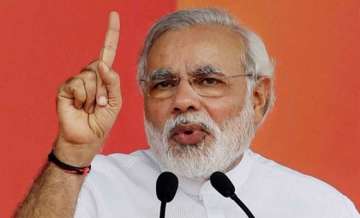3 reasons India should go in for Jan-Dec financial year
The current practice was adopted in 1867 to align the Indian financial year with that of the British government.

The reform measures are rolling for India. Prime Minister Narendra Modi said at the Niti Aayog meet that there have been suggestions for a January-to-December fiscal year instead of the current financial year. That is -- from April to March. The practice was adopted in 1867 to align the Indian financial year with that of the British government.
What prompted this suggestion?
Modi said that because of poor time management, many good initiatives and schemes had failed to deliver the expected results. Also this year, in a first, Modi government had advanced the Budget presentation to February 1.
Weather of our country is a driving factor
Financial year is affected by the behaviour of the South West monsoon. The result can be seen in the preceding financial year as well as the one which falls within the financial year. The Niti Aayog panel wants the Budget to be finalised in October, when the kharif crop is sown. What they eventually want is to present the budget in November so that the reform process - that essentially means money -- is availabale by Jan-Feb and changes can take place.
Farmers are taken care of
Farm allocation is the biggest driving factor behind the suggestion is that the financial year timing did not allow India to account for the impact of monsoon rains. Agriculture, that contributes more than 15% to India’s GDP and above 58% rural households, depend on farm yields. A change in financial year would enable more reforms for farmers.
A global practice
The world does it this way. Yes, the move is in sync with what the rest of the world follows. Most big economies follow the January-December cycle. 156 nations follow calendar year as financial year. It effectively means more business for us.
What experts have to say
Speaking to India TV, Ved Jain, Chartered Accountant, believes that it's a good step for the country as now India can not be aloof to the global economic environment he says, "With the Jan - Dec financial year, the country will become competitive globally and it's the need of the hour also current system of budget doesn't calsulat full monsoon if we go by the jan-dec it will have a better planning and more accurate allocation of funds."
Though he raised concerns as well and said, "All software, accounting and financial parameters needs to be changed which will take time as well as additional manpower to do that."
"But for the larger benefit of the country this can be a good step," he added.
Economists also believe January-to-December financial year will be a good step for the country.
Talking to India TV, Dr SP Sharma, an economist associated with the PHD Chamber of Commerce said, "This arrangement will be a good synchronisation with the world as more than 150 countries following the same pattern."
However, implementing at the time of GST rollout would also means reworking a whole lot of things like -- tax assessment year and reorganise tax infrastructure.
Narendra Modi also called upon the state governments to work with the Centre to build "the India of the dreams of our freedom fighters" by 2022, the 75th anniversary of Independence. He urged states, local governments and all government and non-government organisations to decide goals for 2022, and work in mission mode towards achieving them.
(With inputs from Saurabh Shukla, India TV business correspondent)